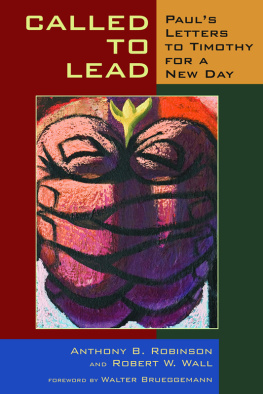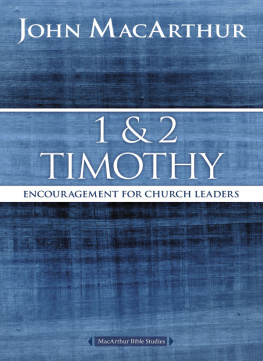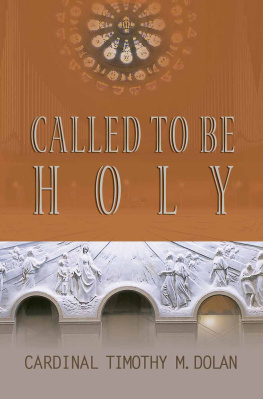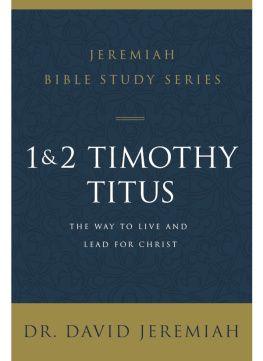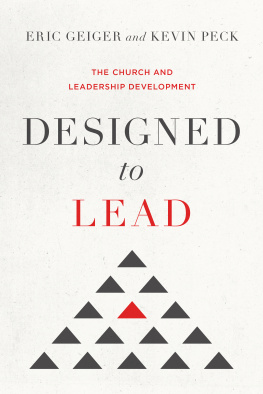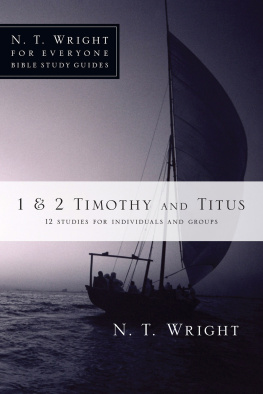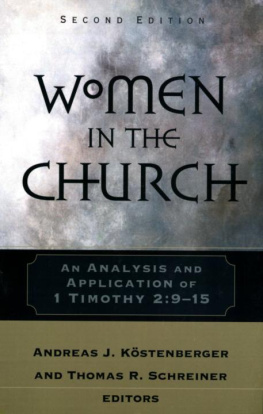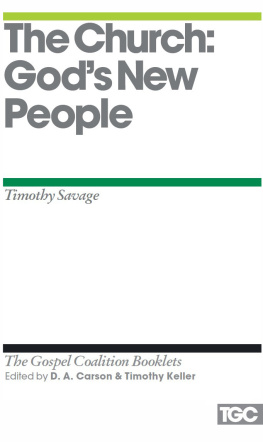
CALLED TO LEAD
CALLED TO LEAD
Pauls Letters to Timothy
for a New Day
Anthony B. Robinson & Robert W. Wall
W ILLIAM B. E ERDMANS P UBLISHING C OMPANY
G RAND R APIDS , M ICHIGAN / C AMBRIDGE , U.K.
2012 Anthony B. Robinson and Robert W. Wall
All rights reserved
Published 2012 by
Wm. B. Eerdmans Publishing Co.
2140 Oak Industrial Drive N.E., Grand Rapids, Michigan 49505 /
P.O. Box 163, Cambridge CB3 9PU U.K.
18 17 16 15 14 13 12 7 6 5 4 3 2 1
Library of Congress Cataloging-in-Publication Data
Robinson, Anthony B.
Called to lead: Pauls letters to Timothy for a new day /
Anthony B. Robinson & Robert W. Wall.
p. cm.
ISBN 978-0-8028-6740-7 (pbk.: alk. paper)
978-1-4674-3617-5 (ePub)
1. Bible. N.T. Timothy Commentaries.
I. Wall, Robert W. II. Title.
BS2745.53.R63 2012
227.8307 dc23
2012007733
www.eerdmans.com
Dedicated to Reinder Van Til, editor and friend
With deepest gratitude to you, Reinder,
for your faithful ministry of the word
Contents
This book is a surprising and generative gift because it dares to propose and develop an interface between two matters that we seldom connect. It moves back and forth between an intractable contemporary bewilderment and two books of the Bible that are rarely read. In the process it greatly illuminates both the intractable bewilderment and the New Testament books.
The intractable bewilderment concerns the destiny of the church in our society. We know about the common worry in the church concerning dollars and members and numbers and programs. We quibble about the reason for decline and play the blame game, all the way from charging that the church is too authoritarian to saying its too liberal. Or perhaps it is just the larger scene of secularism, because people are not so much alienated from the church as they are easily indifferent to the church.
Whatever the reason for the decline that is offered, the antidotes tend to arise from marketing strategies that propose quick fixes or new slogans but do not in fact lead to much substantive change. This bewilderment, taken by itself, is unmanageable: it leads, variously, to Eisenhower era romanticism, to fatigue, to further anxiety and cynicism, or to despair.
The books of 1 and 2 Timothy are not much read, especially among the main-line, progressive churches that this book addresses. These books are regarded as later and non-Pauline; the continuing critical paradigm, moreover, reflected in popular thought, is that these books portray early Catholicism (not of the Roman variety) that transposed a movement into an institution. (It is clear that in more conservative circles, which do not fear authoritative institutions, these books of the Bible do get a better read.) Thus the books reflect growing institutional self-awareness with a fixed body of doctrinal formulation, a fixed canon, as in all Scripture, and orders and offices of ministry that serve the beginning of a hierarchal ordering that seems remote from an earlier church that was propelled by the Spirit. As a result, we may, it has been tacitly agreed, safely disregard these Pastoral Epistles, which do not strike many readers as contemporary or imaginative.
The bewilderment, taken alone, yields a self-help propensity; the Epistles, taken alone, turn out to be an unwelcome testimony to which attention need not be paid. But this volume by Robinson and Wall brings the bewilderment and the letters to Timothy together for a fresh thought about the life of the church. When the bewilderment is brought into the presence of the letters, the bewilderment is reshaped and reformulated. It turns out that the apparent failure of the church is the result of practices that lack rootage in the gospel, rootage that gives staying power among the vagaries of cultural reality. Conversely, the books of Timothy are read very differently when held up in the midst of that bewilderment. Thus the book, with this juxtaposition, invites us to a compelling task of quite practical theology in which the practices of the church reflect the gospel, empower the ministry, and summon the church to be a vigorous player in contemporary life.
This book is a manual on practical theology that is itself grounded in the old post-Pauline manual of Timothy, after the initial zeal of the spirit had waned and the church was left with the daily grind of being followers of the risen Christ, a daily grind that is very ancient and very immediate in the life of the church. A movement may do things once with excitement; an institution has to continue to re-perform those same daily tasks over and over, and lapses, compromises, and cost cutting inevitably occur. This exposition of Timothy attests to what the church must do, over and over, to order its internal life, what the church must do, over and over, to sustain disciplines that are necessary for sustained discipleship.
The interface of bewilderment and 1 and 2 Timothy suggests that steady, regular, intentional practices constitute a sine qua non for church renewal. Such church practices provide identity and the disciplines the church must have in order to counter the deep disciplines and practices that sustain our culture in its pursuit of commodity, power, and control. In the ancient text the disciplines are designed to counter the work of empire, and it is not different for us now.
It is not surprising that these authors can discern the ways of the old text for our time and place. Robinson is a longtime pastor and more recently a consultant who has been able to observe and engage many congregations in various stages of emergency. On the other hand, Wall has kept his attention on the text and has been a witness to its contemporaneity in the demanding world of undergraduate education. This work, shared by pastor and scholar, by a pastor-scholar and a scholar-pastor, invites us to think afresh about rootage and discipline, intentionality and distinct identity. The books of Timothy, read with contemporary alertness, provide a way to move through our current bewilderment with courage and freedom. This book is a recital of the ancient paths that we thought we could shortchange. It turns out that being church is inconvenient. But that inconvenience to which we are called most assuredly yields buoyancy and joy and emancipation from bewilderment when there is practice that matches clarity of vision.
WALTER BRUEGGEMANN
Columbia Theological Seminary
Called to Lead is the second harvest of a friendship three decades long. Ours is an enduring friendship of two people who come from different sides of the theological track, from different denominational backgrounds, and who serve the church in different professional roles.
Robert W. Wall is a biblical scholar and professor at Seattle Pacific University. As a teaching elder of the Free Methodist Church, he is sometimes labeled evangelical, even though his preference is Wesleyan because his activist politics and theology are most significantly shaped by the preaching of John Wesley and the lyrics of Charles Wesley and their ideals of a sanctified discipleship. His published scholarship ranges widely, including numerous published studies and a commentary on the pastoral epistles (Eerdmans, 2012). That commentary supplies the exegetical foundation on which much of the dialogue in the present book rests.
Anthony B. Robinson is a pastor and teacher. He has been a minister and senior pastor in four congregations of the Congregational/ United Church of Christ. In conventional terms he would be described as mainline or liberal. Theologically he has been shaped by the Reformed tradition of Calvin and Edwards. Today he writes and teaches on congregational renewal and leadership, often drawing on our previous study of Acts
Next page
